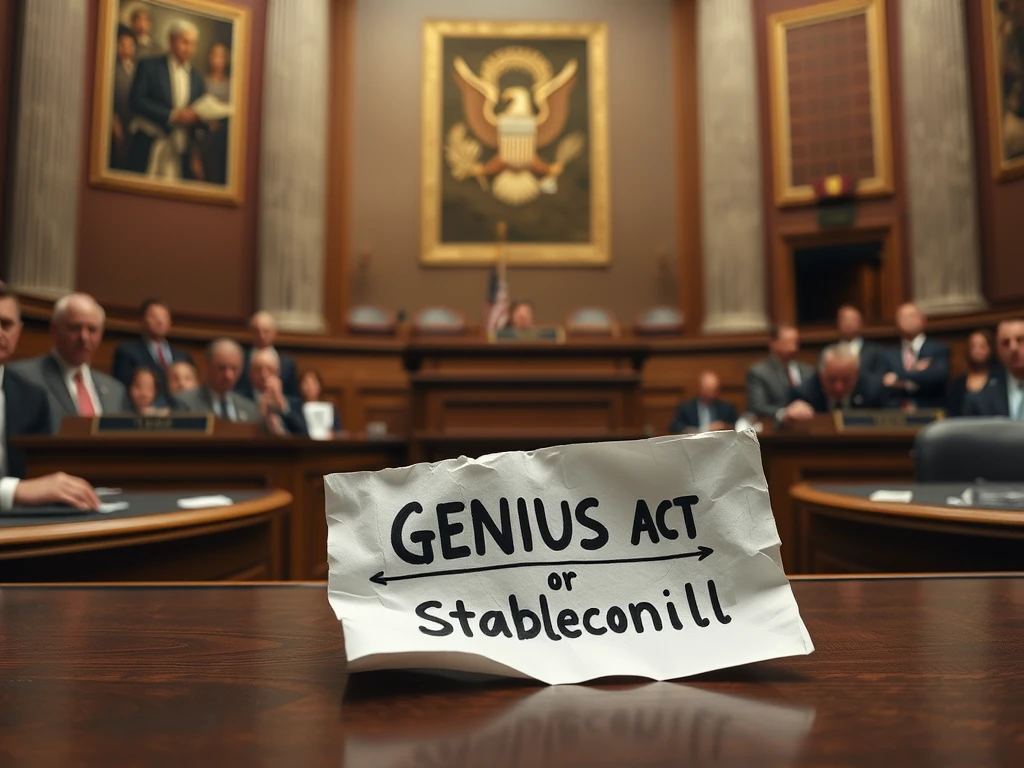Crucial US Stablecoin Bill Suffers Setback in Senate Vote

The path to clear Stablecoin regulation in the United States just hit a significant hurdle. A key piece of proposed legislation aimed at providing clarity for stablecoins failed to advance in the US Senate, leaving the future of these digital assets in a state of uncertainty.
What Happened with the US Stablecoin Bill?
On May 8, the Guiding and Establishing National Innovation for US Stablecoins of 2025 Act, more commonly known as the GENIUS Act, failed to clear a procedural vote called cloture in the US Senate. This vote was crucial for limiting debate and moving the bill towards a final vote. The bill fell short by just one vote.
Sponsored by Senator Bill Hagerty and co-sponsored by Senators Tim Scott, Kirsten Gillibrand, Cynthia Lummis, and Angela Alsobrooks, the GENIUS Act was initially seen as a promising bipartisan effort to bring much-needed regulatory clarity to the digital asset space, specifically focusing on stablecoins used for payments.
Why Did Support for the GENIUS Act Falte?
The primary reason cited for the bill’s failure was a last-minute withdrawal of support from Senate Democrats. Reports indicate that their pushback stemmed from concerns related to US President Donald Trump’s recent ventures into the cryptocurrency space.
Despite the bill having already undergone amendments to include stricter requirements for stablecoin issuers and enhanced Anti-Money Laundering provisions in an attempt to address potential Democratic concerns, the changes were seemingly not enough to secure the necessary votes for cloture.
The Impact on Stablecoin Regulation and Crypto Regulation
The failure of the GENIUS Act represents a setback for proponents of clear Stablecoin regulation in the US. Stablecoins are viewed by many as a critical bridge between traditional finance and the digital asset world, and a clear regulatory framework is considered essential for their widespread adoption and for maintaining the US dollar’s dominance in the digital economy.
Senate Majority Leader John Thune expressed frustration following the vote, stating, “Democrats have been accommodated every step of the way […] frankly, I just don’t get it.” His comments highlight the political challenges involved in passing Crypto regulation in the current environment.
What’s Next for Crypto Regulation in the US?
With the GENIUS Act stalled, the path forward for Stablecoin regulation remains uncertain. This development underscores the complex interplay of policy, politics, and the evolving landscape of digital assets in the US.
Industry participants and observers will be closely watching to see if lawmakers can find another path to establishing a clear framework or if regulatory uncertainty will persist. This is a developing story, and further information will be added as it becomes available.
Summary
The GENIUS Act, a significant bipartisan effort for Stablecoin regulation in the US Senate, failed to pass a key procedural vote on May 8. The setback was primarily attributed to Democratic concerns, reportedly linked to President Trump’s Crypto regulation ventures. The failure highlights the ongoing challenges in establishing a clear regulatory framework for digital assets in the United States.









